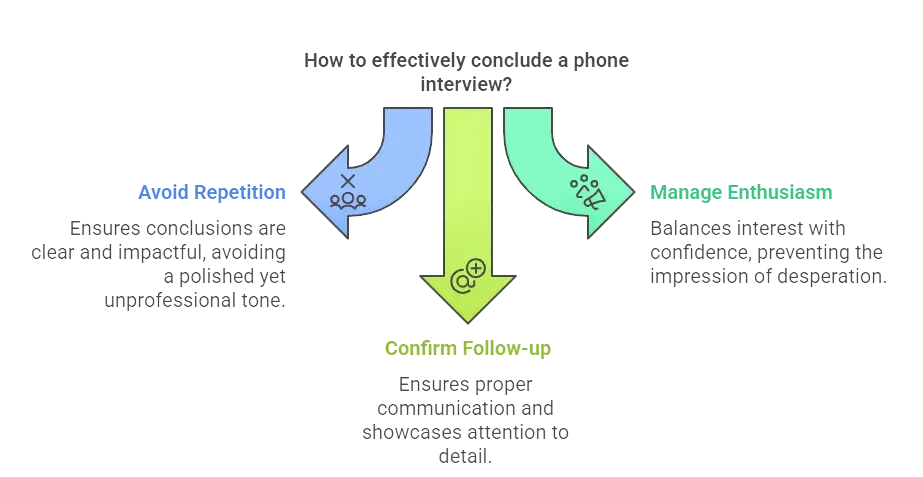You’ve made it through the nerve-wracking questions, explained your experience, and now you're at the finish line: the end of a phone interview. It's easy to think the hard part is over, but how you wrap up an interview can leave a lasting impression. Whether you dazzled the interviewer or not, ending professionally might just tip the scales in your favor. Here’s a concise guide on how to conclude a phone interview with finesse, offering tips, closing questions, and follow-up strategies.
Key Takeaways
- A strong conclusion in a phone interview can leave a lasting impression and boost your chances of success.
- Plan a concise closing statement that highlights your qualifications and enthusiasm for the role, while maintaining an upbeat and confident tone.
- Express gratitude to the interviewer and clarify any next steps in the hiring process to demonstrate proactive engagement.
- Prepare relevant closing questions to show genuine interest in the company and the role, and seek feedback for any additional insights.
- Follow up promptly with a personalized thank-you email, referencing specific interview topics to reinforce your professionalism and interest.
Introduction
Concluding a phone interview might feel like an afterthought, but it's your last chance to leave a lasting impression that could sway a decision in your favor. Just as a poorly executed ending can detract from a great storyline, a lackluster goodbye can diminish what was otherwise a stellar interview. In this guide, you'll learn practical strategies for closing a phone interview with assertiveness and respect. You'll discover the power of a well-crafted exit statement, smart questions to ask, and the know-how for the perfect follow-up, equipping you with the tools to end strong and stand out in the interview process.
Setting the Stage for a Strong Finish
Wrapping up a phone interview with the right touch requires a bit of foresight and strategy. You don't want to leave this critical stage to chance. First, plan your closing statement. This isn't a monologue but a crisp recap of why you’re the right fit for this position. Think of it as your final pitch—a quick synthesis of your qualifications mingled with genuine enthusiasm for the role. Keep it concise; brevity can underscore confidence.
Next, reiterate your interest. Expressing a genuine desire to join the company can stick in the interviewer’s mind. It can be as simple as saying, “I’m really excited about the possibility of contributing to your team.” It closes any lingering doubts about your engagement and commitment to the role.
Lastly, prepare for curveballs. Some interviewers like to throw in last-minute questions or requests for clarification. Anticipate these moments. Have a mental checklist of talking points you might want to hit again or any questions you need to ask. Being ready for the unexpected can reinforce your composure and adaptability, key traits for any potential hire.
EXPERT INSIGHT: There’s a moment at the end of every phone interview where silence hangs—I find that closing the call with an interviewee is more remembered than the resume itself. I’ve seen a heartfelt, confident wrap-up shift decisions and tip the scales. It is not just responding to questions—it is claiming your story to the very end. The closing is your final handshake—do it with intention and make it one to remember. - Charm Paz, CHRP
Essential Phone Interview Tips for Wrapping Up
Finishing a phone interview might seem like a simple task, but it's a golden opportunity to solidify your impression. Here’s how to nail it without fuss.
Mind Your Tone
First off, let’s talk tone. Keep it upbeat and confident. You've likely been a bit on edge during the conversation, so now's the time to ease into something more relaxed yet self-assured. This balance suggests you’re pleased with the dialogue and optimistic about your fit for the role.
Thank the Interviewer
Next, express your gratitude. It doesn’t have to be over the top; a straightforward, “Thank you for taking the time to speak with me today,” goes a long way. It shows you value their investment in the discussion and respect their dedication to finding the right person.
Recap Key Points
As you start to wrap up, briefly sum up your standout qualifications. Link them directly to the role's requirements to remind the interviewer of why you’d be a solid choice. Keep this part concise—a few sentences max. Think of it as a mini highlight reel that leaves them with no doubts about your capabilities.
Clarify Next Steps
Finally, ask about the following stages. This shows you’re proactive and genuinely interested in moving forward. It can be as simple as, “Could you tell me what the next steps in your hiring process are?” This small question emphasizes your eagerness and keeps you in the loop about what to expect.

Effective Closing Interview Questions
Your closing line of questioning can shift an interview from good to great, so don't skimp on preparation here. Start by asking about the company. For example, “Can you describe the company culture?” or “How does the team I'm interviewing with define success?” These questions show you're not just hunting for any job, but aiming to be a part of something larger. They also demonstrate a keen curiosity about the company’s inner workings.
When the timing feels right, consider seeking feedback on your interview performance. A subtle approach could be, “Is there anything else you’d like to know about my experience that we didn’t cover?” This not only opens the floor for additional conversation but also gives you a chance to clarify any misunderstandings.
Lastly, focus on clarifying role expectations. Ask, “What does a typical day look like for this position?” or “What are the immediate challenges you foresee for someone in this role?” This serves a dual purpose: it helps you understand exactly what you’re getting into and shows the interviewer that you’re already envisioning yourself in the job. Ending with these questions not only wraps up the interview with clarity but also solidifies your proactive stance.
The Follow-Up: Securing Your Spot
The interview might be over, but your job isn't. Following up is your opportunity to reinforce your interest and professionalism. Start with a timely follow-up email—send it within 24 hours. Keep it brief, but hit the high notes: gratitude for the interview, a nod to a memorable part of your conversation, and a final note of enthusiasm for the role. Make sure your message feels personal, not canned. Reference specific topics from your discussion to show you were engaged and attentive.
As you draft your follow-up, double-check contact details. A simple error here can derail an otherwise polished approach. Be sure you’re reaching the right person, and get their name right—spelling counts.
Finally, close with a polite inquiry about the next steps or timeline. This not only shows you're proactive but also keeps you informed. The goal is to keep the door open and stay top-of-mind as they make decisions. In short, your follow-up is your final handshake—make it firm, make it count.
Common Mistakes to Avoid
As you wrap up your phone interview, be mindful of common mistakes that can undermine your efforts. First, steer clear of repetition. Repeating phrases or using filler words can make your conclusions sound unpolished. Keep your closing points clear and concise to maintain impact.
Secondly, watch out for over-enthusiasm. It's crucial to express interest in the role, but don't cross the line into pushiness or desperation. Keep your tone balanced—a controlled enthusiasm will convey confidence without seeming overeager.
Finally, don’t fall into the forgetfulness trap. Always make sure you know who to follow up with. Confirm the interviewer's contact information before the call ends. This proactive step will prevent communication mishaps and showcase your attention to detail. Remember, a seamless finish depends on the finer points just as much as the grand gestures.

Resources and Further Reading
In the modern job market, success often hinges on having access to the right information. To aid in further honing your interview skills, we've curated a selection of helpful resources.
- Background Check Insights: Understanding what comes next after a phone interview can be crucial. Dive into detailed articles like "Most Common Background Check Questions" to prepare for potential queries post-interview. This resource lays out typical questions you might encounter, ensuring you're not caught off guard during later stages.
- Additional Tools: The Society for Human Resource Management (SHRM) offers comprehensive guidelines on background checks and other hiring essentials. Their toolkit on "Conducting Background Investigations" is an essential read for any prospective employee wanting to understand the depth and scope of hiring protocols.
Remember, the more you know about the process, the better you can position yourself in every aspect of the interview journey. These resources can equip you with the necessary insights to navigate the complexities of background checks and follow-up procedures, ultimately increasing your chances of success.
Frequently Asked Questions
How should you end a phone interview?
To end a phone interview effectively, express appreciation for the opportunity and reaffirm your interest in the position. Politely ask about the next steps in the hiring process to show your eagerness and engagement.
What to say at the end of a phone interview?
Conclude by thanking the interviewer for their time. You might say, "Thank you for the opportunity to discuss my qualifications. I am very interested in the role and look forward to the next steps."
How do you leave a positive impression at the end of a phone interview?
Leave a positive impression by summarizing key points of the discussion, expressing your enthusiasm for the role, and restating your relevant strengths. Ensure your tone is confident yet courteous.
Should you ask questions at the end of a phone interview?
Yes, asking questions demonstrates your interest and engagement. Consider asking about the company culture, potential team members, or the timeline for the hiring process.
How do you follow up after a phone interview?
Follow up with a thank-you email within 24 hours, reiterating your interest and qualifications. Mention a specific point from the interview to personalize your message.
What is the best way to thank an interviewer after a phone interview?
Send a concise thank-you email, expressing gratitude for the conversation and reiterating your excitement about the opportunity. Keep the tone professional and include any additional information that may strengthen your candidacy.
Conclusion
Let's recap: Summarize confidently, show gratitude, and clarify the next steps. These are your cornerstones for professionally concluding a phone interview. Remember, the interview isn't over until the phone clicks. A strong finish signals reliability and attention to detail—qualities employers cherish.
Think of the end of your interview as the last paragraph in a compelling story. You want to leave the reader—your potential employer—thoroughly interested and eager for more. A polished ending doesn’t just cap a conversation; it opens doors. Now, apply these strategies, and you'll be one step closer to sealing the deal. Go ahead, practice your close. It might just be your ticket to landing that coveted role.
Resources
- University of California, Berkeley. (n.d.). Effective Communication in Job Interviews. Retrieved from https://career.berkeley.edu/Interview/Comm
- University of North Carolina at Chapel Hill. (n.d.). Interviewing Skills. Retrieved from https://careers.unc.edu/resources/interviewing-skills/
- U.S. Department of Labor. (n.d.). Job Search Toolkit - Interviewing. Retrieved from https://www.dol.gov/agencies/eta/jobsearch-toolkit/interviewing

GCheck Editorial Team
Meet the GCheck Editorial Team, your trusted source for insightful and up-to-date information in the world of employment background checks. Committed to delivering the latest trends, best practices, and industry insights, our team is dedicated to keeping you informed.
With a passion for ensuring accuracy, compliance, and efficiency in background screening, we are your go-to experts in the field. Stay tuned for our comprehensive articles, guides, and analysis, designed to empower businesses and individuals with the knowledge they need to make informed decisions.
At GCheck, we're here to guide you through the complexities of background checks, every step of the way.






